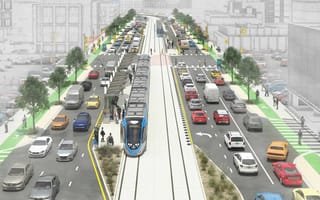
Austin voters just approved the largest transportation upgrade in city history. Named Project Connect, the $7.1 billion plan — which is a mix of new rail lines, expanded bus routes, additional park-and-rides and more — addresses what proponents of the measure identified as one of the primary issues corporations look for when choosing a headquarter locale: access to reliable public transportation.
For Austin, a city that has consistently been rated as one of the most congested cities in the United States, the traffic problem is set to only become more dire as more people move to the city.
Over the next 20 years, the city’s population is expected to double. Tech companies are driving much of the growth, with companies like Tesla, Hippo Insurance and OJO Labs helping add a record number of jobs this year. Yet, while more new jobs have been added in the city this year, fewer companies are hiring: by the end of September, the Greater Austin Chamber of Commerce recently found that just 32 companies had announced relocations or expansions in Austin in 2020, compared to 58 the year prior.
According to Matthew Geske, vice president of regional infrastructure and mobility at the Chamber, a lack of reliable public transportation could be slowing the number of relocations and stymying tech companies’ ability to recruit, particularly since the industry tends to skew younger. Tech companies’ young workers often move to Austin without cars, Geske said, coming from places like New York City, Chicago or Boston, which already have established public transportation systems.
“Companies will be able to keep and recruit employees because there’s a multitude of options on how to get around,” Geske told Built In. “Whatever it is that they want to do, there’s gonna be options for them to get around the city outside of having to get in car and drive in traffic everyday to get somewhere.”
The city’s first rail line likely won’t come online for another eight years, Geske said.
More than 58 percent of Austinites voted in favor of Proposition A, which ensures the initial investment of Project Connect will be completed. Austin officials are counting on federal funding and Capital Metro to cover the rest. In addition to financing the initial development, Prop A also devotes $300 million in city funds for anti-displacement housing strategies.
Geske said that measure will help to offset the effect of gentrification, which critics say the tech industry has exacerbated by driving up rent prices and pushing minority families out of Austin. He said city officials are building an online tool that will be able to forecast how Project Connect will drive up the cost of living in each neighborhood, so it can invest the funds toward the most affected communities.
“This is going to be huge for the next 20 to 30 years and beyond, considering not just the cost, but how much the population continues to grow,” Geske said. “That alone is huge, and it’s a great opportunity for our community to work together.”



